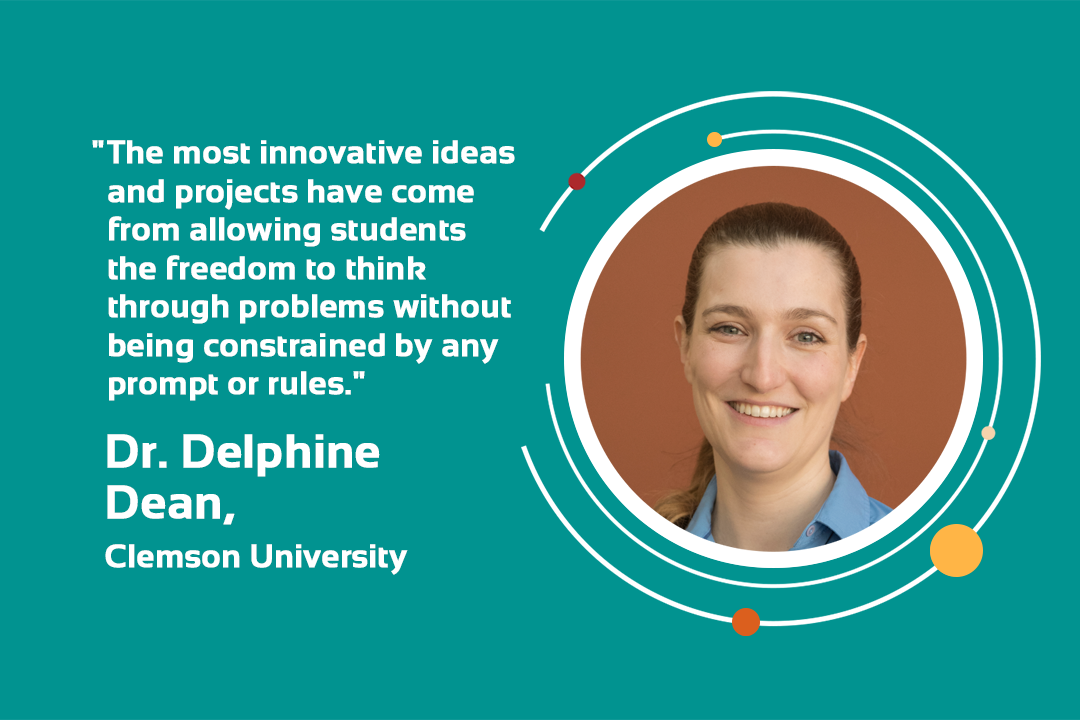
Our Faculty Spotlight series highlights educators within the VentureWell network who are doing transformative work — faculty members who are catalyzing change in higher education and inspiring students to impact the world through invention. This month’s spotlight is Dr. Delphine Dean, the Rob and Jane Lindsay Family Innovation Professor of Bioengineering at Clemson University. She is committed to providing students with the entrepreneurial knowledge and collaboration opportunities to identify and develop innovative solutions to global health issues. Dr. Dean has overseen a number of translational design projects with students, culminating in two different startups and a variety of technologies directed at benefitting low-resource areas. Some examples of these innovations include basket-woven braces for neck injuries, low-cost sensors to detect early stage kidney disease, breast pumps that remove HIV from breast milk, and an ink-jet printer reconfigured to print strips that can be used to test blood sugar for diabetics. Dr. Dean received a VentureWell Faculty Grant (now called Course & Program Grants) in 2020 to develop a biomedical entrepreneurship and innovation course in which students learn how to apply STEM concepts to global problems in health disparity in low-resource environments.
Tell us about your journey infusing entrepreneurship in your field and curriculum.
During my first few years as a professor, I didn’t really think about entrepreneurship and how to pull that into our curriculum. However, it quickly became apparent that in order for the technologies we were developing to actually translate out of the lab and have impact, I needed to think about training the students (and myself!) on entrepreneurship and business.
Tell us about the program you received a VentureWell faculty grant for.
The goal of our program is to create a new biomedical entrepreneurship and innovation course delivered internationally via a highly interactive online platform. This undergraduate course will address global health needs and access, health disparities, and cultures in low-resource regions. Students in the US will partner with peers at institutions in India and Tanzania. Through the program, students will not only work on innovative projects to address health issues but they will also gain entrepreneurial and marketable career skills for biomedical engineering and innovation. In addition, given the current pandemic and the push to more online collaborative environments, I think this program will help students gain real-world collaboration skills, global competencies, and cross-cultural understanding which I believe will set them up well for future careers.
What are the challenges you’re tackling in your work today, and how are you addressing them?
Right now, our biggest challenge has been the ongoing COVID-19 pandemic. This has affected all aspects of our daily lives. I’ve been running all of our university’s COVID-19 testing and we’re running 6,000–7,000 tests every day. Students have had to navigate changing guidelines and course delivery methods. Our international collaborators have also been greatly affected; things have closed down and reopened several times in the last several months. One positive outcome has been the proliferation of more effective online communication tools and platforms, which we are taking full advantage of to help us restart collaborations that had been put on pause during pandemic surges. Several of our students have actually started working on technologies to address some of the issues they have seen emerge during this pandemic.
What’s your most useful classroom activity or assignment?
At the beginning of the semester, we have students spend a week researching an issue related to global health and then think through some ideas of how to address that. Some of the most innovative ideas and projects have come from allowing students the freedom to think through problems and ideas without being constrained by any prompt or rules. A lot of the ideas are maybe not always the most practical or feasible but we learn a lot from talking through what the issues are. More importantly, students also come up with really innovative out of the box ideas that can be real game changers.
Tell us about a moment or experience that reaffirmed the importance and value of STEM entrepreneurship education for you.
Watching students graduate and use the skills they learned in class to really make positive change in the world is what makes my job rewarding.
As we continue to evolve how we champion support for innovation and entrepreneurship in higher education, VentureWell is transitioning from Course & Program Grants (C&P Grants) to a new VentureWell fellowship. Our C&P Grants have empowered a generation of changemakers nationwide, and we are excited to continue this mission by enhancing the role of faculty leaders as ecosystem builders in partnership with industry and government. Be the first to hear about news and updates on the new VentureWell fellowship by signing up for our waitlist!